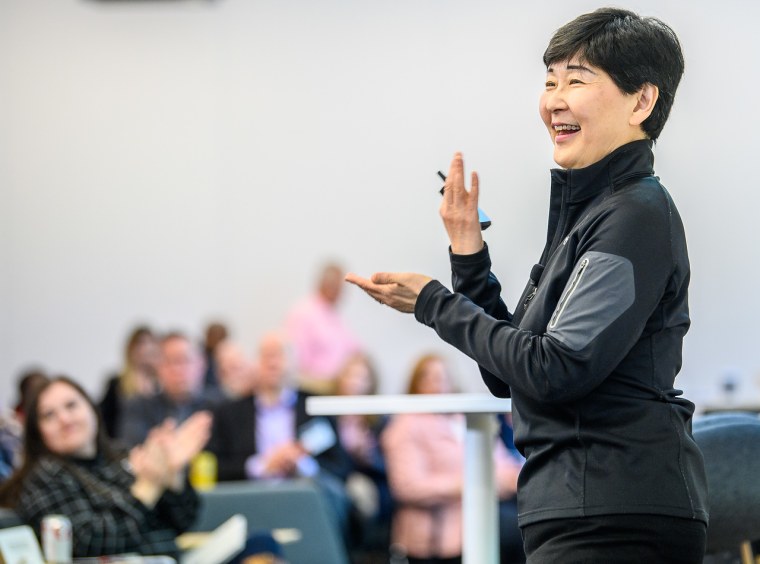Asian-Americans are still stereotypically perceived as the “model minority,” yet studies show that unconscious bias and typecasting can keep them from getting promoted in the workplace, especially if you’re a woman. In fact, recent research from the Harvard Business Review found that Asian-Americans are the “least promotable” group.
“While it’s common in Asian cultures to value behaviors such as humility, learning and willingness to serve the greater good, these thoughtful behaviors are sometimes misunderstood as lacking leadership or passion,” said Dr. Roz Tsai, vice president of talent, learning and org effectiveness at Thrivent, a Fortune 500 financial services firm. She is also a first-generation immigrant from China.
Dr. Tsai chatted with Know Your Value to mark the end of Asian American and Pacific Islander Heritage Month.
McKinsey’s “Women in the Workplace” study found that Asian American employees drop in representation and promotions at senior levels, and Asian women experience the greatest decrease.
The study surveyed more than 400 large organizations across the United States and also found that Asian American women make up less than 1 percent of promotions from senior vice president to the C-suite.
“Day to day challenges for AAPI professionals in our corporate setting are real,” said Dr. Tsai, 58. “At the same time, I think progress is possible.”
After coming to America at 20 years old, Dr. Tsai found success in the American corporate world working at companies including Honeywell, Lawson Software (now Infor) and Northern States Power Company (now Xcel Energy). That said, she faced her own challenges.
“I've been told that I’m too nice, that my style is not a strong leadership style,” she recounted. “Looking back, I would tell myself to be bolder, to assert my value.”
Dr. Tsai shared her top tips for her fellow AAPI women professionals to thrive in the workplace and inch closer to their next promotion.
1. Be bold.
Asian-American employees can appear less assertive and might not be the first to speak up or debate an idea, said Dr. Tsai. If this is misread as lacking confidence or executive presence, teams lose out on the contributions their Asian-American colleagues can offer. “I encourage all AAPI professionals to be bolder at expressing their career ambitions and be more intentional about helping their colleagues understand their values,” said Dr. Tsai. “Be willing to take credit for your contributions without being overly inhibited by our innate values of humility.”
2. Find a mentor.
This is especially important for immigrant employees. Dr. Tsai noted that mentorship and learning opportunities are invaluable resources. From day-to-day challenges to guidance on career ambition, it’s critical to provide mentorship to Asian-American employees who have all the skills to succeed but may lack the understanding of American corporate culture needed to rise to leadership levels.
3. Understand pre-existing stereotypes.
According to a report by STAATUS, nearly 50 percent of Americans believe Asian-Americans are discriminated against. Conversations with your coworkers and managers can begin to combat these pre-existing stereotypes.
“Of all the racial groups surveyed, Asian-Americans—especially young, Asian-American women— are the least likely to feel they completely belong and are accepted,” said Dr. Tsai, adding stereotypes can create subconscious misconceptions in the workplace. “Instead of feeling like something is wrong with you, or you need to fit in more, really understand the [stereotypes you may face as an AAPI professional in corporate America],” said Dr. Tsai. “That way you’re more prepared, [can speak with your coworkers and managers, tailor your skills and be on a path to promotion].”
At the same time, Dr. Tsai encouraged leaders to take an active role with AAPI professionals by being communicative and inclusive.
“I encourage our leaders to really invest in getting to know their AAPI team members and really invest in building team norms where everyone has a voice,” said Dr. Tsai. “Leaders should invest in mentoring and sponsoring the highly skilled and motivated AAPI team numbers because when we can unleash everyone's potential, we all win.”
